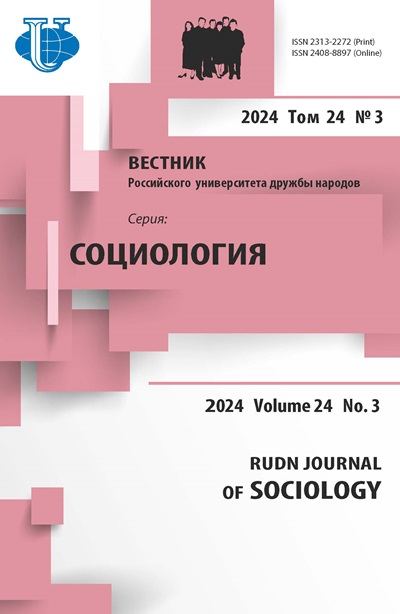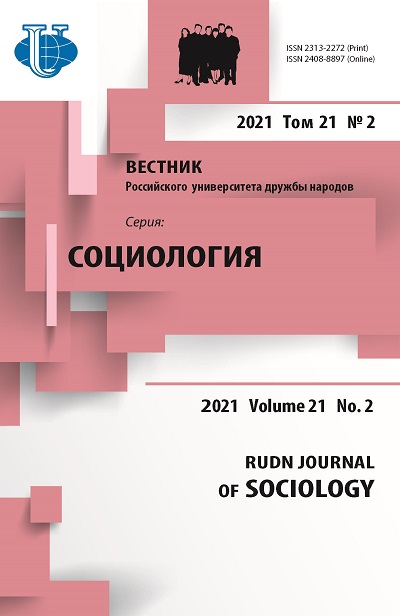Online communities in the study of political communication
- Authors: Platonov K.A.1, Legostaeva N.I.1
-
Affiliations:
- Saint Petersburg State University
- Issue: Vol 21, No 2 (2021)
- Pages: 391-402
- Section: Sociological lectures
- URL: https://journals.rudn.ru/sociology/article/view/26825
- DOI: https://doi.org/10.22363/2313-2272-2021-21-2-391-402
Cite item
Full Text
Abstract
Online communities in the study of political communication are a relatively new research field. Within its framework, independent thematic sections are developing, which in many respects remain fragmented due to the insufficient systematization. The article presents the results of the analysis and description of the research field of online communities in the context of political communication based on 60 English-language sources. This sample included publications on a wide range of issues: from the activity of official accounts and websites of politicians, parties, organizations to the user behavior and political discussions in virtual communities. The authors identified five large thematic groups that consider online communities in different research perspectives: classification of communities, study of their structure and elements, analysis of their strategies and tactics, functions and effects, and ‘life cycles’. The article describes the main features and internal structure of the identified thematic groups, considers approaches and methods for solving specific tasks in the study of actors, channels, practices and models of political communication. The authors also consider the technical factors of the formation of communities, differences in methods and units of analysis, types of political communicants. The authors make a conclusion about the sufficient ‘maturity’ of the research field and its thematic sections, which is combined with the differing popularity of research topics. Online communities represent a special public space which allows researchers to answer questions about the success of political leaders, movements and organizations, the effects of the viral spread of online protests and flash mobs, and the audience’s response to significant politicized issues. The authors identify two trends in the development of the corresponding methodology: strengthening practical orientation and increasingly complex techniques based on the machine algorithms for data analysis.
About the authors
K. A. Platonov
Saint Petersburg State University
Author for correspondence.
Email: konplatonov@gmail.com
кандидат социологических наук, специалист Центра социологических и интернет-исследований
Universitetskaya Nab., 7/9, Saint Petersburg, 199034, RussiaN. I. Legostaeva
Saint Petersburg State University
Email: n.legostaeva@spbu.ru
кандидат социологических наук, старший научный сотрудник Лаборатории изучения социально-экономических и политических процессов современного общества
Universitetskaya Nab., 7/9, Saint Petersburg, 199034, RussiaReferences
- Allison K., Bussey K. Communal quirks and circlejerks: A taxonomy of processes contributing to insularity in online communities. Proceedings of the International AAAI Conference on Web and Social Media. 2020; 14.
- Backstrom L. et al. Group formation in large social networks: Membership, growth, and evolution. Proceedings of the 12th ACM SIGKDD International conference on Knowledge Discovery and Data Mining; 2006.
- Bainbridge W. The Social Structure of Online Communities (Structural Analysis in the Social Sciences). Cambridge; 2020.
- Barnes R. Uncovering Online Commenting Culture: Trolls, Fanboys and Lurkers. Springer; 2018.
- Ben-David A., Fernández A.M. Hate speech and covert discrimination on social media: Monitoring the Facebook pages of extreme-right political parties in Spain. International Journal of Communication. 2016; 10.
- Beyer J.L. Expect Us: Online Communities and Political Mobilization. Oxford University Press; 2014.
- Boulianne S. Social media use and participation: A meta-analysis of current research. Information, Communication & Society. 2015; 18 (5).
- Christensen H.S. Political activities on the Internet: Slacktivism or political participation by other means? First Monday. 2011. URL: https:/doi.org/10.5210/fm.v16i2.3336.
- Christensen K., David L. Encyclopedia of Community: From the Village to the Virtual World. Sage Publications; 2003.
- Conover M.D. et al. Political polarization on Twitter. ICWSM. 2011; 133 (26).
- Dolata U., Schrape J.F. Masses, crowds, communities, movements: Collective action in the Internet age. Social Movement Studies. 2016; 15 (1).
- Earl J., Kimport K. Digitally Enabled Social Change: Activism in the Internet Age. MIT Press; 2011.
- Ekman M. The dark side of online activism: Swedish right-wing extremist video activism on YouTube. MedieKultur: Journal of Media and Communication Research. 2014; 30.
- Eltantawy N., Wiest J.B. The Arab spring: Social media in the Egyptian revolution: Reconsidering resource mobilization theory. International Journal of Communication. 2011; 5.
- Fernando S. et al. Towards a large-scale Twitter observatory for political events. Future Generation Computer Systems. 2020; 110.
- Ferrucci P., Hopp T., Vargo C.J. Civic engagement, social capital, and ideological extremity: Exploring online political engagement and political expression on Facebook. New Media & Society. 2020; 22 (6).
- Freelon D., Lokot T. Russian disinformation campaigns on Twitter target political communities across the spectrum. Misinformation Review. 2020. URL: https:/doi.org/ 10.37016/mr-2020-003.
- Gayo Avello D., Metaxas P.T., Mustafaraj E. Limits of electoral predictions using Twitter. Proceedings of the 5th International AAAI Conference on Weblogs and Social Media; 2011.
- Gerbaudo P. Tweets and the Streets: Social Media and Contemporary Activism. Pluto Press; 2012.
- Glubok B. Understanding Digital Political Communities: A Juxtapolitical Approach to Intimacy Online. 2020. URL: https:/escholarship.org/uc/item/16q2c1tw.
- González-Bailón S., Wang N. Networked discontent: The anatomy of protest campaigns in social media. Social Networks. 2016; 44.
- Guleva V. et al. Topology of thematic communities in online social networks: A comparative study. International Conference on Computational Science. Springer; 2018.
- Hammond M. What is an online community? A new definition based around commitment, connection, reciprocity, interaction, agency, and consequences. International Journal of Web Based Communities. 2017;13 (1).
- Han S.H., Brazeal L.A.M., Pennington N. Is civility contagious? Examining the impact of modeling in online political discussions. Social Media+ Society. 2018; 4 (3).
- Hill B.M., Shaw A. Studying Populations of Online Communities. The Handbook of Networked Communication. New York; 2017.
- Hopkinson C. Trolling in online discussions: From provocation to community-building. Brno Studies. 2013; 39 (1).
- Iriberri A., Leroy G. A life-cycle perspective on online community success. ACM Computing Surveys. 2009; 41 (2).
- Karpf D.A. Unexpected Transformations: The Internet’s Effect on Political Associations in American Politics. Philadelphia; 2009.
- Kreiss D. Seizing the moment: The presidential campaigns’ use of Twitter during the 2012 electoral cycle. New Media & Society. 2016; 18 (8).
- Lazar J., Preece J. Classification schema for online communities. AMCIS Proceedings; 1998.
- Lee S. Characterization and detection of political manipulation in online communities. Journal of Internet Technology. 2018; 19 (4).
- Lovejoy K., Saxton G.D. Information, community, and action: How nonprofit organizations use social media. Journal of Computer-Mediated Communication. 2012; 17 (3).
- Man C.K. Luring the lurkers: Increasing participations in the online discussions of a blended learning course. International Journal on E-Learning Practices. 2014; 1 (1).
- Morales A.J., Losada J.C., Benito R.M. Users structure and behavior on an online social network during a political protest. Physica A: Statistical Mechanics and its Applications. 2012; 391 (21).
- Myagkov M. et al. Islamist communities on VKontakte: Identification mechanisms and network structure. Europe-Asia Studies. 2020: 1.
- Nazi A., Das M., Das G. The TagAdvisor: Luring the lurkers to review web items. Proceedings of the ACM SIGMOD International Conference on Management of Data; 2015.
- Nonnecke B., Preece J. Lurker demographics: Counting the silent. Proceedings of the SIGCHI conference on Human Factors in Computing Systems; 2000.
- Papacharissi Z. The virtual sphere: The internet as a public sphere. New Media & Society. 2002; 4 (1).
- Parmelee J.H. The agenda-building function of political tweets. New Media & Society. 2014; 16 (3).
- Pérez-Curiel C., Limón-Naharro P. Political influencers. A study of Donald Trump’s personal brand on Twitter and its impact on the media and users. Communication & Society. 2019; 32 (1).
- Preece J., Maloney-Krichmar D., Abras C. History of online communities. Encyclopedia of Community. 2003; 3.
- Rentschler C.A., Thrift S.C. Doing feminism in the network: Networked laughter and the ‘Binders Full of Women’ meme. Feminist Theory. 2015; 16 (3).
- Rheingold H. The Virtual Community: Finding Connection in a Computerized World. Addison-Wesley Longman Publishing; 1993.
- Ridings C.M., Gefen D., Arinze B. Some antecedents and effects of trust in virtual communities. Journal of Strategic Information Systems. 2002; 11 (3-4).
- Rowe M., Saif H. Mining pro-ISIS radicalization signals from social media users. Proceedings of the 10th International AAAI Conference on Web and Social Media; 2016.
- Shim KJ. et al. Does fear of isolation disappear online? Attention-seeking motivators in online political engagement. Media and Communication. 2019; 7 (1).
- Smitten S.I. Political potential and capabilities of online communities. German Policy Studies. 2008; 4.
- Soon C., Kluver R. The Internet and online political communities in Singapore. Asian Journal of Communication. 2007; 17 (3).
- Syerov Y., Trach O., Fedushko S. Effect of implementation of improved methods of the life cycle stages organisation to the online community management. URL: arXiv:1901.00736. 2018.
- Takikawa H., Nagayoshi K. Political polarization in social media: Analysis of the ‘Twitter political field’ in Japan. 2017 IEEE International Conference on Big Data; 2017.
- Thelwall M., Cugelman B. Monitoring Twitter strategies to discover resonating topics: The case of the UNDP. El Profesional de la Información. 2017; 26 (4).
- Theocharis Y. et al. Using Twitter to mobilize protest action: Online mobilization patterns and action repertoires in the Occupy Wall Street, Indignados, and Aganaktismenoi movements. Information, Communication & Society. 2015; 18 (2).
- Tsao R., Preece J., Lazar J. One foot in cyberspace & the Other on the ground: A case study of analysis and design issues in a hybrid virtual and physical community. WebNet Journal: Internet Technologies, Applications & Issues. 1999; 1 (3).
- Tufekci Z., Wilson C. Social media and the decision to participate in political protest: Observations from Tahrir Square. Journal of Communication. 2012; 62 (2).
- Van Es K., Wieringa M., Schäfer M.T. Tool criticism: From digital methods to digital methodology. Proceedings of the 2nd International Conference on Web Studies; 2018.
- Velasquez A. Social media and online political discussion: The effect of cues and informational cascades on participation in online political communities. New Media & Society. 2012; 14 (8).
- Vidgen B., Yasseri T. Detecting weak and strong Islamophobic hate speech on social media. Journal of Information Technology & Politics. 2020; 17 (1).
- Vromen A. et al. Online movement mobilization and electoral politics: The case of GetUp! Communication, Politics & Culture. 2011; 44 (2).
- Wieringa M. et al. Political topic-communities and their framing practices in the Dutch Twittersphere. Internet Policy Review. 2018; 7 (2).
- Zhou X., Chan Y.Y., Peng Z.M. Deliberativeness of online political discussion: A content analysis of the Guangzhou Daily website. Journalism Studies. 2008; 9 (5).
Supplementary files
There are no supplementary files to display.














